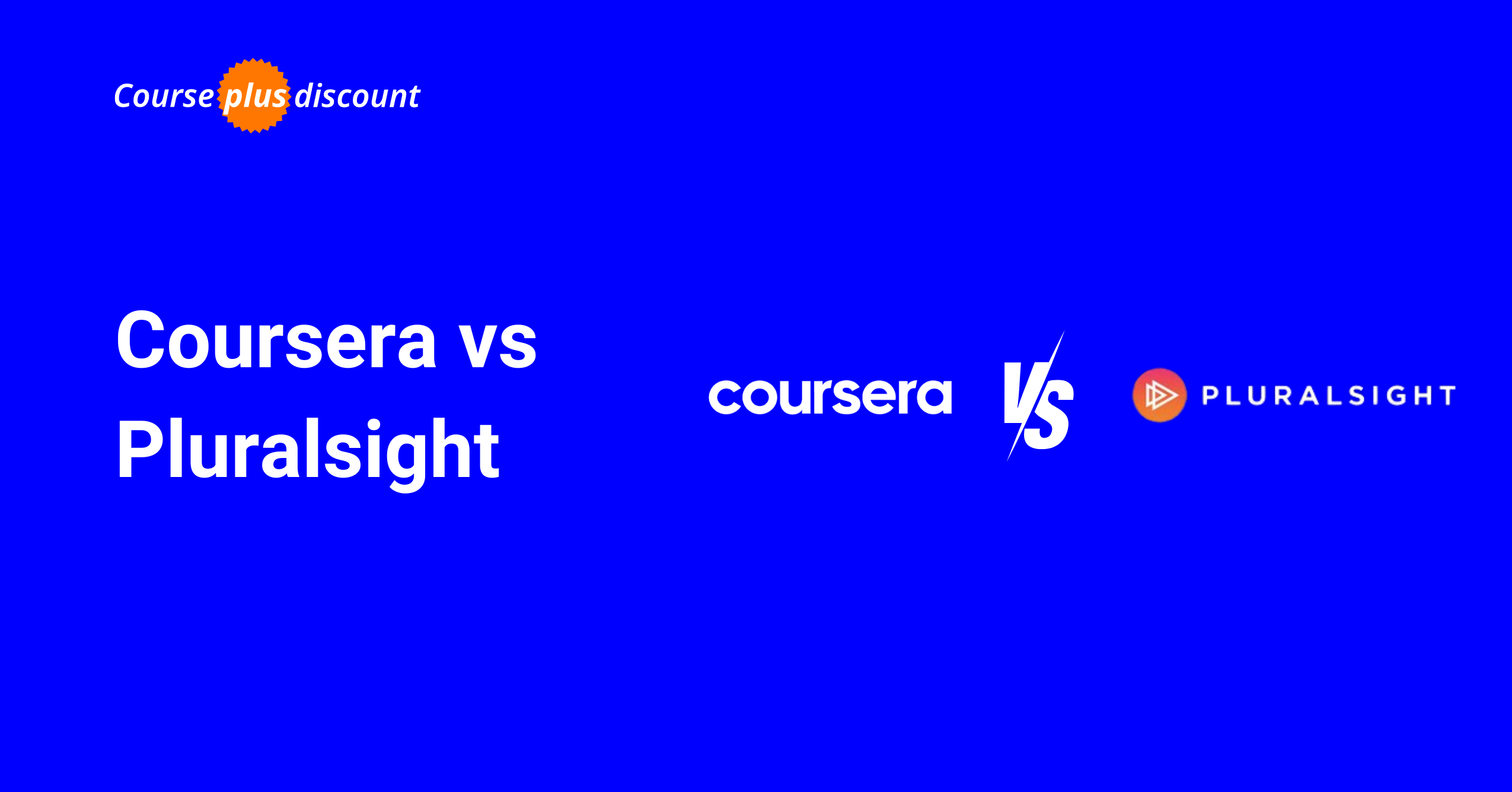Coursera vs Pluralsight, both of these are which the most recognized online learning platforms, each with its own unique strengths and specialties. While Coursera partners with top universities to offer academic courses across various subjects, Pluralsight focuses on in-depth tech and IT training for professionals.
So if you’re a student, a career-switcher, or an upskilling developer, understanding their core differences can help you choose wisely.
In this guide, we compare their features, course offerings, pricing models, and learning experience to give you a clear picture. Let’s explore what sets Coursera and Pluralsight apart—and which one is better suited to your learning needs.
But which one offers the best value for your time and investment? Let’s find out through a detailed comparison.
Coursera vs Pluralsight: In A Nutshell
Here are some basics about Coursera and Pluralsight in an easy-to-understand table. This information in the table is just an overview. You will find detailed information in the rest of the article.
| Features | Coursera | Pluralsight |
|---|---|---|
| Free Courses | Yes | Limited free trials |
| Free Trial | 7 Days | 10 Days |
| Founded | 2012 | 2004 |
| Course Range | A wide variety (Business, Tech, Arts, etc.) | Focused on Technology and IT |
| Price Range of Subscription | $59 to $399 | $29 to $449 |
| Number of Courses | 7,000+ | 7,000+ |
| Certification | University-backed certificates | Course completion certificates |
| Target Audience | Students and professionals across fields | Tech professionals and aspiring developers |
| Pricing Model | Per course or subscription | Subscription-based |
| Corporate Training | ✅ | ✅ |
| Mobile App | ✅ | ✅ |
| Offline Learning | ✅ | ✅ |
This table will help you understand why I say, “Both provide quality online learning but cater to different audience needs.”
Coursera offers diverse, university-backed courses in various fields with flexible pricing.
Meanwhile, Pluralsight specializes in tech-focused training using a subscription model. Both provide quality online learning but cater to different audience needs.
Note: Find details of the Coursera Free Trial here.
Coursera Overview
Coursera is a global online learning platform that partners with top universities and organizations worldwide. It offers various courses, specializations, and even full degree programs across various disciplines.

Coursera offers courses in diverse fields, including business, technology, science, humanities, and social sciences. Topics range from computer science and data analysis to healthcare, arts, languages, and personal development, catering to various academic and professional interests.
Coursera’s Key features include:
- University partnerships for accredited courses.
- Flexible learning schedules.
- Peer-reviewed assignments.
- Interactive quizzes and projects.
- Professional certificates from industry leaders.
Coursera’s target audience includes students seeking additional academic support, professionals looking to upskill or change careers, and lifelong learners interested in exploring new subjects.
Pluralsight Overview
Pluralsight is a technology learning platform that provides high-quality, in-depth courses. Its primary audience is tech professionals and aspiring developers seeking to enhance their skills or stay current with industry trends.

Pluralsight specializes in technology-focused courses, covering areas like software development, IT operations, data science, cloud computing, cybersecurity, and artificial intelligence.
Pluralsight’s key features include:
- Skill assessments and personalized learning paths.
- Hands-on learning experiences with interactive courses.
- Expert-led video courses.
- Projects and labs for practical application.
- Analytics for tracking progress and skill development.
Pluralsight primarily targets IT professionals, software developers, and individuals aspiring to enter or advance in the tech industry. Companies also use it for employee training and skill development in technical roles.
Coursera vs Pluralsight: Detailed Comparison
Let’s get into the details now. In this detailed comparison, I will examine 8 key parameters that differentiate Coursera and Pluralsight.
By the end of this section, you’ll clearly understand how these platforms stack up in terms of course quality, user experience, and overall value for different types of learners.
1. Course Offerings And Subject Areas
Coursera Courses:
Coursera offers various subjects, including business, computer science, data science, humanities, and social sciences. It also offers complete degree programs and professional certificates in partnership with Ivy League colleges and top companies like Google, Meta, and Microsoft.

Note: Get information about all the Coursera Plus Discounts here.
Pluralsight Courses:
Pluralsight focuses primarily on technology-related subjects. It provides in-depth courses on programming languages, software development, IT operations, cybersecurity, and data science. I loved Pluralsight’s skill paths and role-based learning tracks.

Verdict: Coursera offers more diversity in subject areas, while Pluralsight Courses provides deeper coverage specific to tech-related fields.
2. Learning Experience And Interface
Coursera Interface:
I enjoyed using Coursera as it has a clean, intuitive interface with easy navigation. It provides video lectures, readings, quizzes, and peer-graded assignments, which assist in learning any subject.
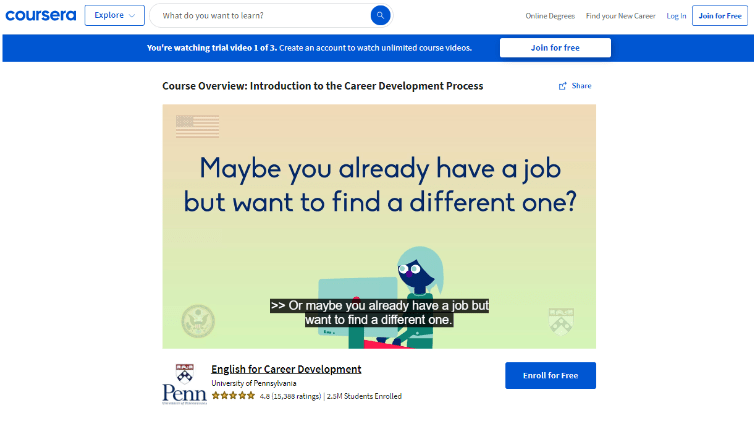
Coursera also presents progress tracking and deadlines to keep learners on schedule. However, I wish discussion forums for student interaction were a little more active. It is not like you do not get responses, but the waiting period is longer than that I experienced on Pluralsight.
Pluralsight Interface:
Pluralsight has a more modern interface than Coursera, which I thought was perfect for tech-savvy users. It offers interactive courses with coding challenges and hands-on projects that help users learn by practicing a subject.
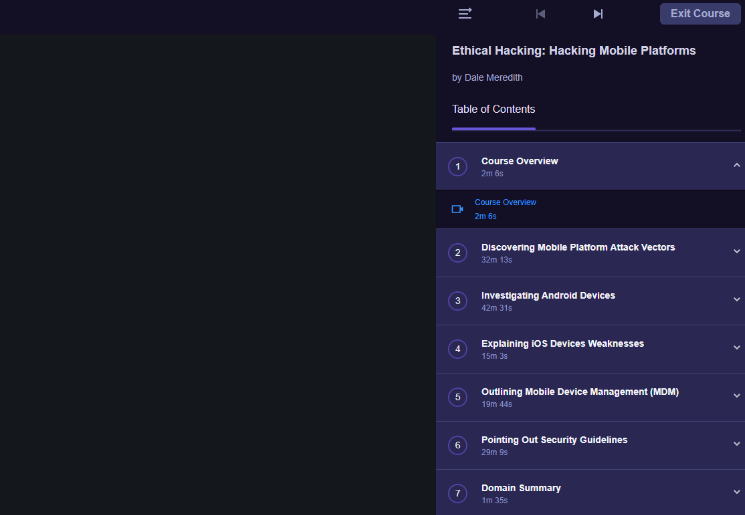
You can also get skill assessments on Pluralsight that will help you to personalize learning paths. Pluralsight has a more active forum and community of learners than Coursera.
Note: Both Coursera and Pluralsight offer transcripts and closed captions for accessibility
Verdict: Coursera offers user-friendly interfaces that are easy for everyone, whereas Pluralsight’s tech-focused design may appeal more to its tech-savvy target audience.
3. Instructor Quality And Expertise
Coursera Quality:
Courses are taught by professors from top universities and industry experts on Coursera. My number one reason for having faith in Coursera is that it shows how much effort they put into ensuring a quality control process for course creation.

Coursera offers diverse instructors from various academic and professional backgrounds and translations in 21+ languages.
Pluralsight Quality:
On Pluralsight, courses are created by industry practitioners and recognized experts in tech fields. The emphasis on learning is given via the practical, real-world knowledge and skills learning method.

Pluralsight course quality surprised me with how often they update their content to keep pace with ever-evolving technology changes, making this a good option for learning about the latest tech developments.
Verdict: Both platforms boast high-quality instructors, with Coursera offering more academic expertise and Pluralsight focusing on industry practitioners.
4. Certifications And Accreditation
Coursera Certifications :
Coursera is one of the few online learning platforms that offers accredited certificates from universities and companies. Many Coursera certificates can count towards college credits.
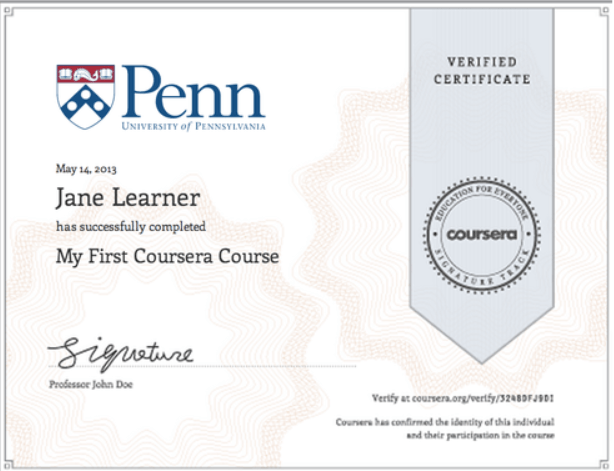
Many employers recognize all the Coursera professional certificates as they are awarded by big tech companies and taught by their experts.
Pluralsight Certifications:
Pluralsight also provides course completion certificates. However, these certificates are not as good as Coursera’s as they are not accredited or recognized as Coursera’s. Pluralsight certificates may hold less academic weight but are still valued in tech industries.

I like using Pluralsight to prep for industry-recognized certifications (e.g., CompTIA, AWS, Cisco). Your subscription to Pluralsight might also give you a discount on your certification exam fees.
Verdict: Coursera’s certifications generally carry more academic weight, while Pluralsight’s are highly regarded in tech industries.
5. Corporate Training Options
Coursera:
Coursera for Business offers customized learning programs for organizations. It provides analytics and reporting tools for tracking employee progress and allows companies to create custom courses and learning paths for them and their company.

Pluralsight:
Pluralsight Skills for Businesses offers team and enterprise plans. It provides advanced analytics and skill assessments for workforce planning and offers hands-on labs and sandboxes for practical skill development.
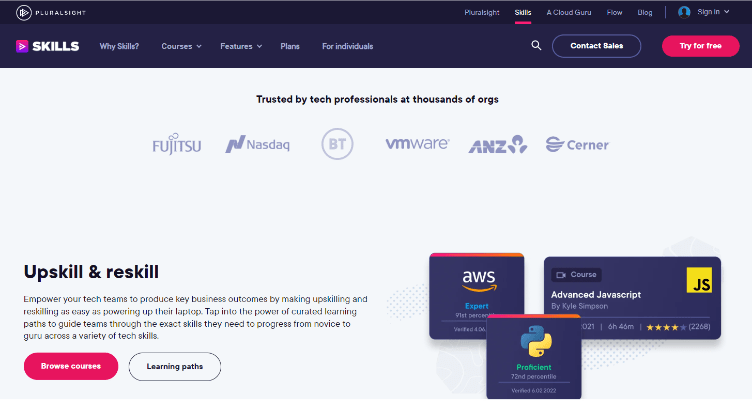
Verdict: Both platforms offer solid corporate training options, with Pluralsight having a slight edge for tech-focused companies.
6. Mobile App And Offline Learning Capabilities
Coursera:
Coursera has a mobile app available for iOS and Android. This Coursera app allows you to download course materials for offline viewing. To save your progress, make sure you sync progress across devices.

Pluralsight:
Pluralsight’s mobile app is also available for iOS and Android. It allows offline viewing of downloaded courses, as well as offline skill assessments and learning checks.
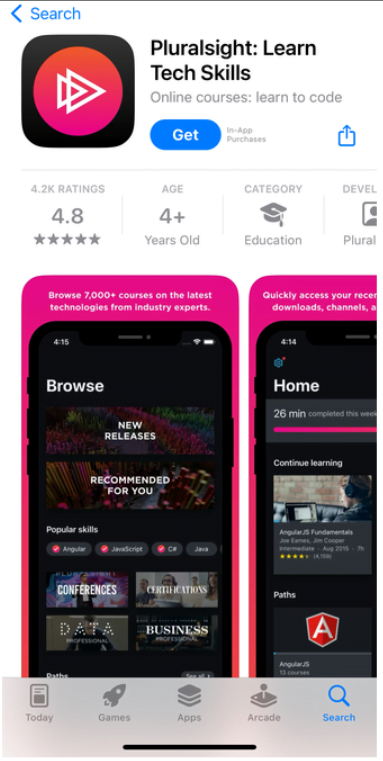
Verdict: Both platforms offer robust mobile and offline learning capabilities with similar features.
7. Community Features And User Engagement
Coursera Community and Help :
The Coursera community and help center is a helpful feature only if the course you are taking is popular. I say this because Coursera offers course-specific discussion forums. The level of community support largely depends on course enrollments, with popular courses offering more active discussions and quicker responses.

A standout feature of Coursera is its peer-graded assignments, which not only assess learning but also foster student interaction. Additionally, some courses offer virtual study groups.
Note: Get a Coursera Student Discount!
Pluralsight Community and Help:
Pluralsight tech community has many Q&A sections for each course, which helps you solve many of your general doubts. I loved how they have an active Slack community for learners and instructors.

Pluralsight’s unique offering is its regular webinars and live coding sessions, which help you network and stay motivated to learn more.
Verdict: Coursera’s academic approach fosters more traditional community engagement, while Pluralsight’s tech-focused community may appeal more to its target audience.
8. Coursera vs Pluralsight: Recent Updates
Coursera:
To keep up with the AI wave, Coursera has introduced more AI and machine learning courses. They have also expanded partnerships with tech companies for professional certificates so that Coursera learners can get jobs after taking these certificate courses.
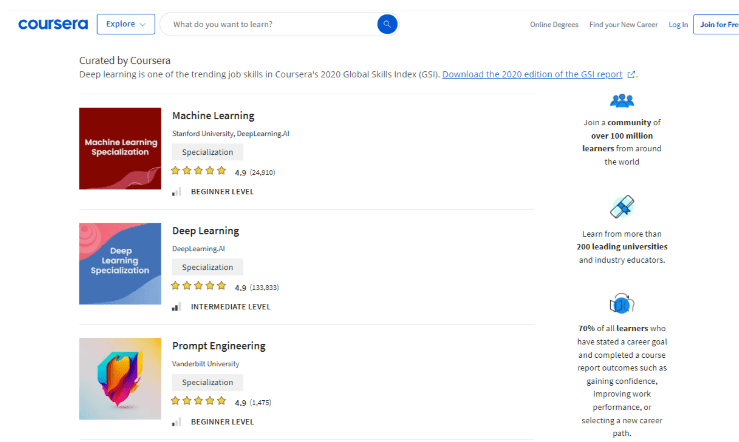
Pluralsight:
Pluralsight recently introduced a new “Cloud Labs“ product specifically for hands-on cloud computing experience. In recent times, they have expanded cybersecurity course offerings and launched “Pluralsight Flow” for developer productivity analytics.
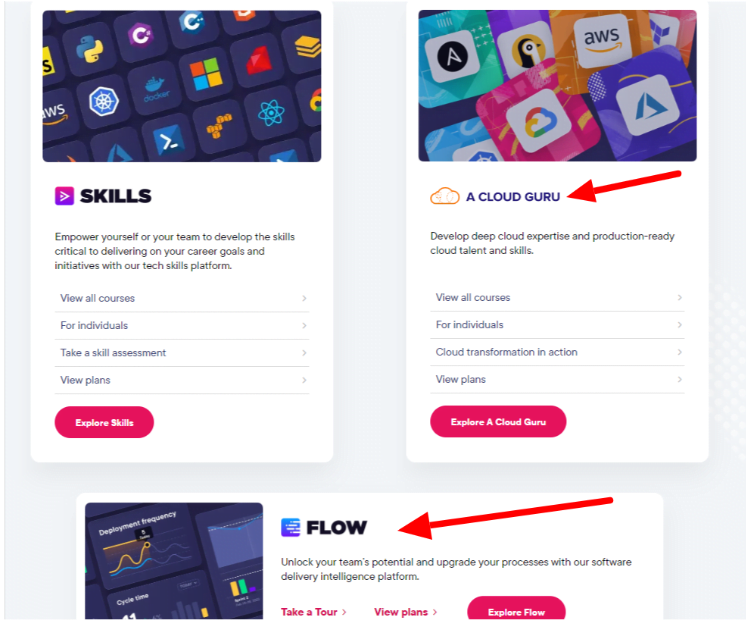
Verdict: These recent updates show both platforms are continuously evolving to meet the changing needs of learners and the job market.
Coursera vs Pluralsight: Unique Selling Points
While the previous comparisons offer valuable insights, Coursera and Pluralsight are not comparable and each have distinct unique selling points (USPs) that may influence your decision. Let’s explore these key differentiators to help you choose the right platform.
Coursera’s Partnerships With Universities and Companies
Coursera’s standout feature is its partnerships with prestigious universities and leading companies. This collaboration offers a unique blend of academic rigor and industry relevance.
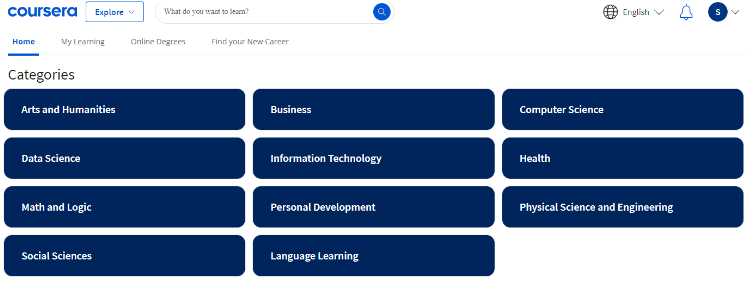
Additionally, Coursera provides accredited degree programs, including bachelor’s and master’s degrees. This combination of theoretical knowledge and practical skills sets Coursera apart in e-learning.
Pluralsight’s Focus on Technology and IT Skills
Pluralsight differentiates itself by specializing in technology and IT-related skills. The platform covers programming languages, software development, IT ops, and cybersecurity.

However, What makes Pluralsight unique is its focus on skill assessment and career paths that offer unique features such as:
- Skill IQ and Role IQ assessments to benchmark learners’ abilities.
- Interactive courses with coding challenges and projects.
- Learning paths tailored to specific tech career roles
Pluralsight also prides itself on regular content updates, ensuring learners stay current with rapidly evolving tech trends.
Coursera vs Pluralsight Cost
When comparing Coursera and Pluralsight, cost is a crucial factor. Both platforms offer various pricing models to suit different needs.
Let’s break down their pricing structures in the table below to help you make an informed decision.
Coursera’s pricing model looks like the table given below:
| Parameters | Coursera |
|---|---|
| Monthly price | $59 |
| Monthly Premium plan | ❌ |
| Yearly price | $399 |
| Yearly Premium | ❌ |
| 7 Day Free trial | Only on the Annual Plan |
Note: Check my Coursera review and learn which one is better for you, Coursera or Coursera Plus.
You can access Individual course purchases ranging from $29 to $99 on Coursera. My recent Coursera purchase has been of the Coursera Plus annual subscription at $399/year, as it helped me earn unlimited certificates and saved me the hassle of paying for each course individually.
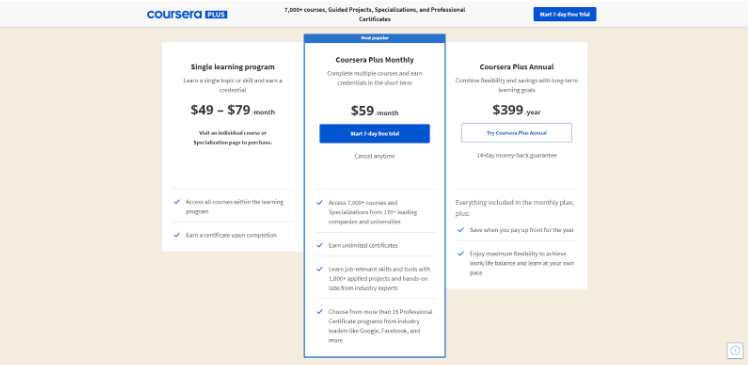
However, the Coursera specializations (priced between $39-$79/month) and the Coursera Degree programs (typically from $999 to $25,000) are not included in the subscription on Coursera.
Note: With a limited-time offer, you can also get Coursera Plus for 1 dollar here.
Pluralsight, on the other hand, offers structured plans without options to choose courses individually :
| Parameters | Pluralsight |
|---|---|
| Monthly Price | $29 |
| Monthly Premium Plan | $45 |
| Yearly Price | $299 |
| Yearly Premium | $449 |
| 10 Day 10 Day Free Trial | Available for both |
The choice between these pricing models often depends on the learner’s goals, commitment level, and financial resources.

Pluralsight Standard plan at $29/month or $299/year is suitable for individuals. A Premium plan at $45/month or $449/year is suitable if you want a pre-made learning path. As the name suggests, “Team” plans starting at $399/user/year are best for office use.
Coursera vs Pluralsight: User Reviews
User feedback provides valuable insights into these platforms’ real-world experiences. I would like you to judge the two platforms based on many opinions, so here is what people are saying about Coursera and Pluralsight on G2.
Coursera Testimonials of G2
Note: Check what Reddit users are saying about Coursera here.
Pluralsight Testimonials
Common Criticisms For Coursera vs Pluralsight
I hope these criticisms help potential learners like you to make informed decisions about which platform suits their needs and where it needs some improvement.
For Coursera, users often mention:
- Inconsistency in peer-graded assignments
- Some courses are outdated.
- Limited direct interaction with instructors.
- A potentially confusing pricing structure.
Pluralsight, on the other hand, receives criticism for:
- Its primary focus is on tech skills, which limits options for non-tech learners.
- The perceived high cost of yearly subscriptions for some users.
- Varying content quality between instructors.
- Limited options for formal certifications.
Coursera vs Pluralsight: Which One Is Worth Your Time and Investment?
Choosing between Coursera and Pluralsight depends on various factors. Consider the following when making your decision:
1. Career goals and industry focus
2. Learning style preferences
3. Budget and time commitment
4. Need for accredited certificates or degrees
5. Current skill level and desired depth of knowledge
6. Try free courses or trials from both platforms if available
By carefully considering these factors, you can determine which platform aligns best with your learning needs and career aspirations.
Coursera is the go-to platform for academic and diverse professional learning. Its partnerships with universities and companies provide a wide range of subjects and the opportunity to earn recognized degrees and certificates.
Note: Once a year, you can get up to $100 off with a Coursera Cyber Monday discount and save $299 with Coursera Black Friday.
For those seeking in-depth technology and IT skills, Pluralsight is the better choice. Its focus on tech-related content and regular updates make it ideal for staying current in rapidly evolving tech fields.
Conclusion: Coursera & Pluralsight Are Made For Different Audiences And Can Not Be Compared!makes
Choosing between Coursera vs Pluralsight depends entirely on your learning goals. If you’re seeking academic credentials, university-backed certificates, or a diverse subject range, Coursera is the way to go.
However, if you’re focused solely on tech skills, hands-on projects, and personalized learning paths in software and IT, Pluralsight delivers exceptional value. Both platforms are industry leaders, but serve different audiences.
Based on the comparison above between course type, teaching style, certification weight, and pricing you can know pick the option that suits your needs. Regardless of your pick, both platforms provide flexible, high-quality online learning for individuals and businesses aiming to grow in today’s digital-first world.
So what is it going to be? Pick Coursera vs Pluralsight and start your learning journey today!
